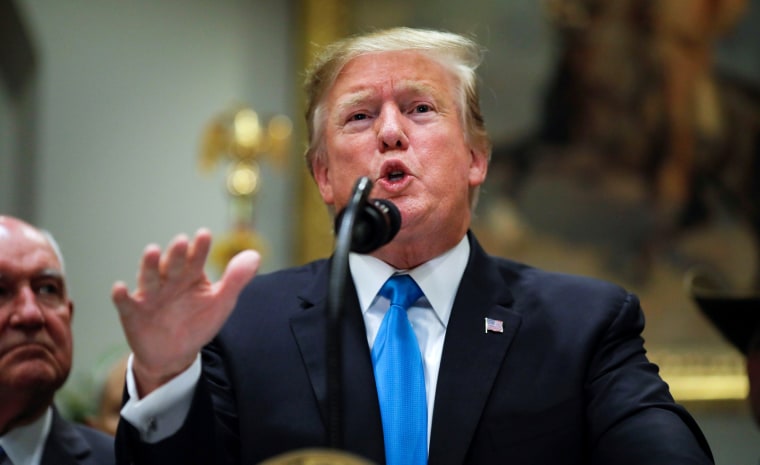WASHINGTON — President Donald Trump on Thursday announced a $16 billion aid package for American farmers aimed at softening the financial blow created by the ongoing trade war with China.
"Our farmers will be greatly helped," Trump said during a press event in the Roosevelt Room at the White House. "The 16 billion [dollar] funds will help keep our cherished farms thriving."
Thursday’s announcement comes as tensions continue to escalate between the United States and China and negotiations have largely stalled.
Earlier this month, talks between the two countries ended without a deal as Trump imposed another round of tariffs on $200 billion of Chinese goods. And both Trump and President Xi Jinping of China have signaled that they are prepared for a long fight, if necessary.
Thursday's aid package is the second bailout the Trump administration has issued in response to decreased agriculture trade with China. Last November, Trump announced $12 billion in aid to “make it up” to farmers, as he described it.
"During that time of negotiation, if everyone remembers, we had a period where China would target our farms," Trump said Thursday. "Now is the time to insist on fair and reciprocal trade for our workers and our farmers."
Trump added that he was "hopeful" that trade talks could begin again with China, but if that didn't happen, "that’s fine."
"These tariffs are paid for largely by China," Trump continued, repeating claims that the tariffs were being paid out by China, not American importers. However, a study published Thursday by the International Monetary Fund found that the tariff revenue on Chinese goods “has been borne almost entirely” by U.S. importers.
Communities that supported Trump in the 2016 election have been some of the hardest hit by the ongoing trade war, and some say there is reason for Republicans to be concerned as the window to reach a deal with China before the 2020 election continues to narrow.
“I think President Trump is counting on his tariff bailout payments to buy support for him among farmers, but this is a bigger issue,” Richard Oswald, 69, of Langdon, Missouri, a fifth generation farmer, said in a phone interview with NBC News. “This is going to bite a lot of Republicans when it’s all said and done. I don’t think he understands the stress people are under and it shows a lack of compassion.”
The timing of the administration's decision to roll out another bailout, as farmers are still deciding what crops to plant this season, has come under criticism from some lawmakers.
“We want farmers to make decisions on how many acres of corn and soybeans to plant based on the market and not something the government’s doing,” Sen. Chuck Grassley, R-Iowa, told reporters Wednesday.
Farmers are required to plant a crop to ultimately receive aid from the federal government later in the year, according to the U.S.Department of Agriculture.
That could also be an issue because producers are so far behind on planting corn and soybeans as well as most other crops, the USDA reported earlier this week. The nearly unprecedented level of delay is largely due to the flooding in the Midwest.
"The challenge is that a lot of folks can’t get a crop in the ground because of the rain in the Midwest. We’re historically slow on planting right now," said John Newton, the chief economist of the Farm Bureau.
Jonathan Coppess, the former Farm Service Agency administrator and the director of the Gardner Agriculture Policy Program at the University of Illinois, also expressed concerns about the aid package.
“Frankly the most immediate issues they need to clear up is the requirement that you need to plant a crop to get payment. The risk of impacting planting decisions is already in place. They’re telling them explicitly that they have to plant something," Coppess said in an interview with NBC News, cautioning the potential for a further depressed market.
In addition to the $16 billion aid funds, Trump also announced plans to roll back some regulations on farming in the coming days, although he did not provide specifics. "We're saving our farmers and ranchers from ridiculous regulations,” Trump said Thursday.
Trump is expected to meet with Xi at the G-20 summit in June.
Lauren Egan reported from Washington and Phil McCausland reported from New York.


